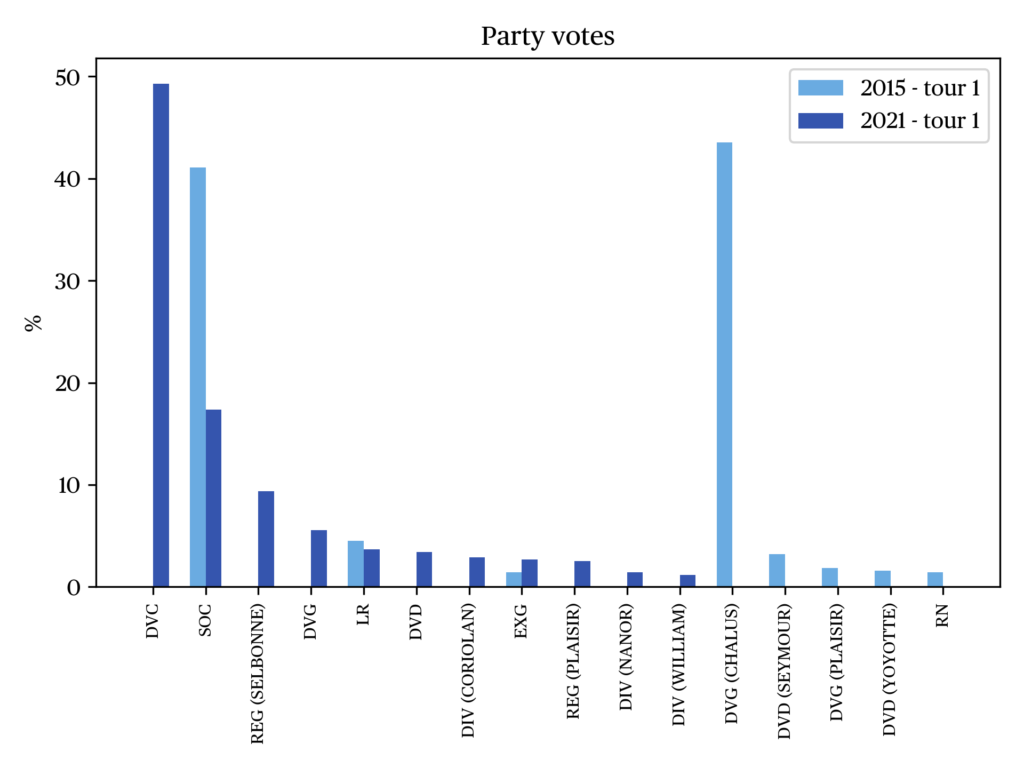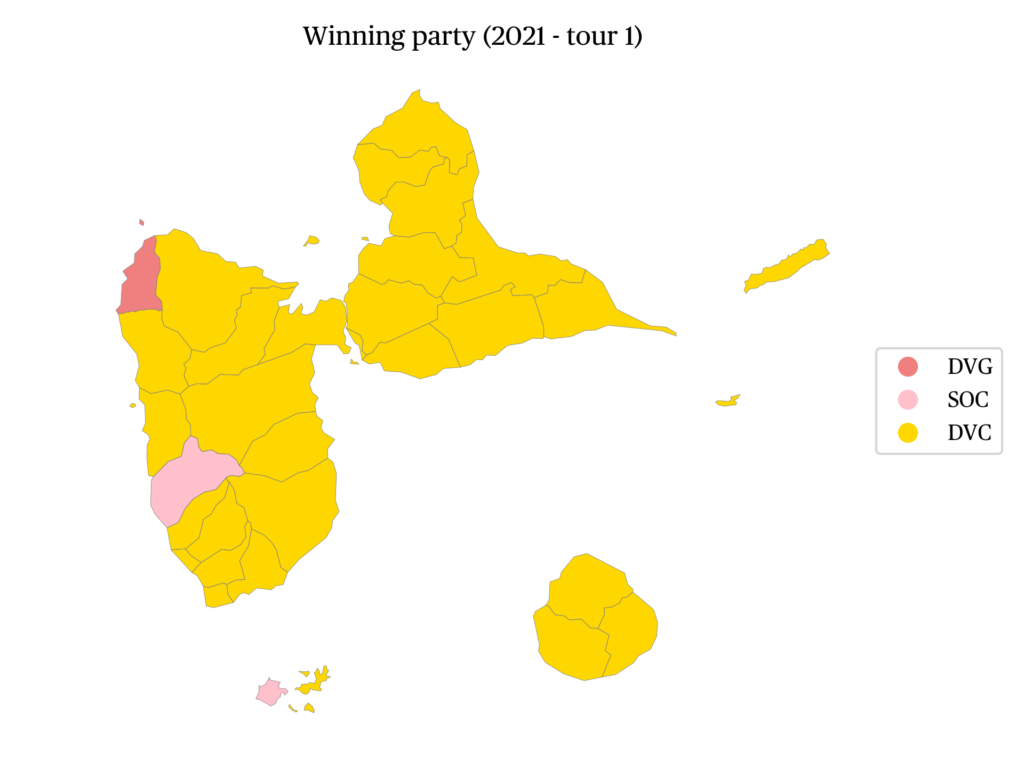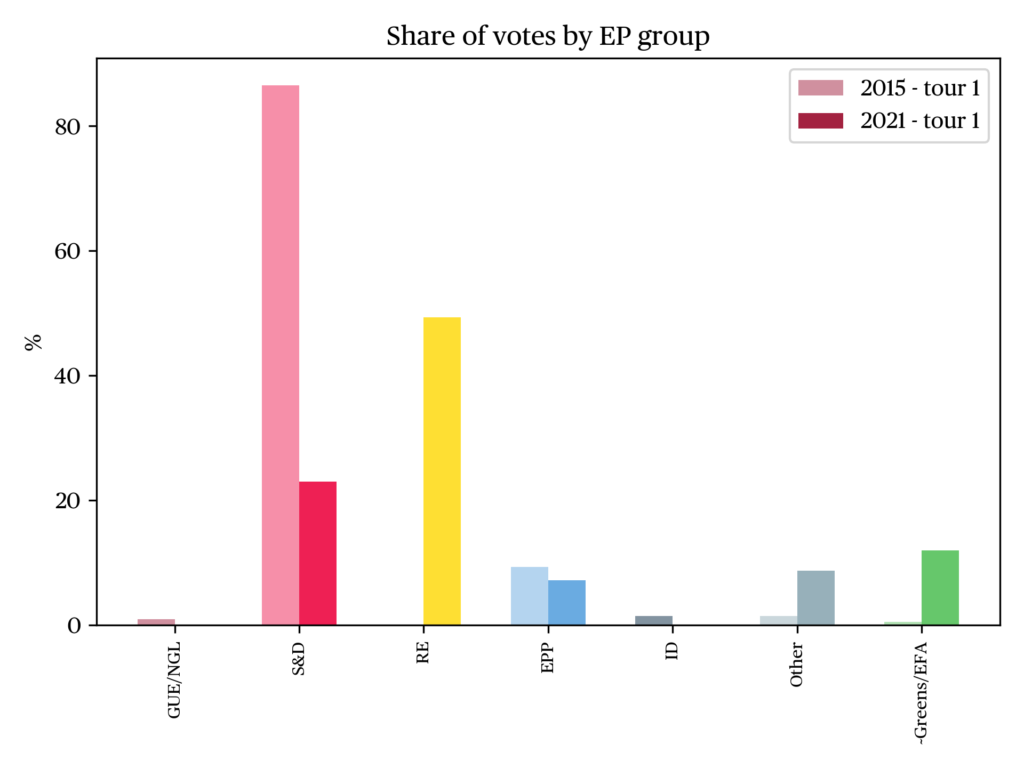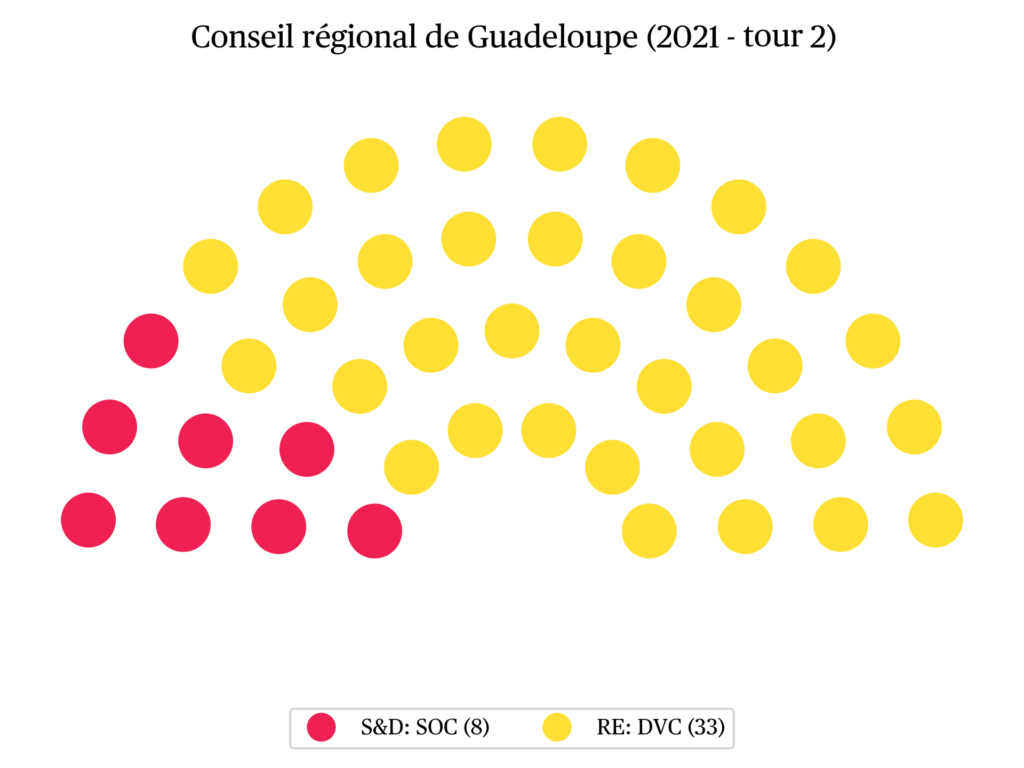Regional election in Guadeloupe, 20-27 June 2021
Fred Reno
Professor of political science at Université des AntillesIssue
Issue #2Auteurs
Fred Reno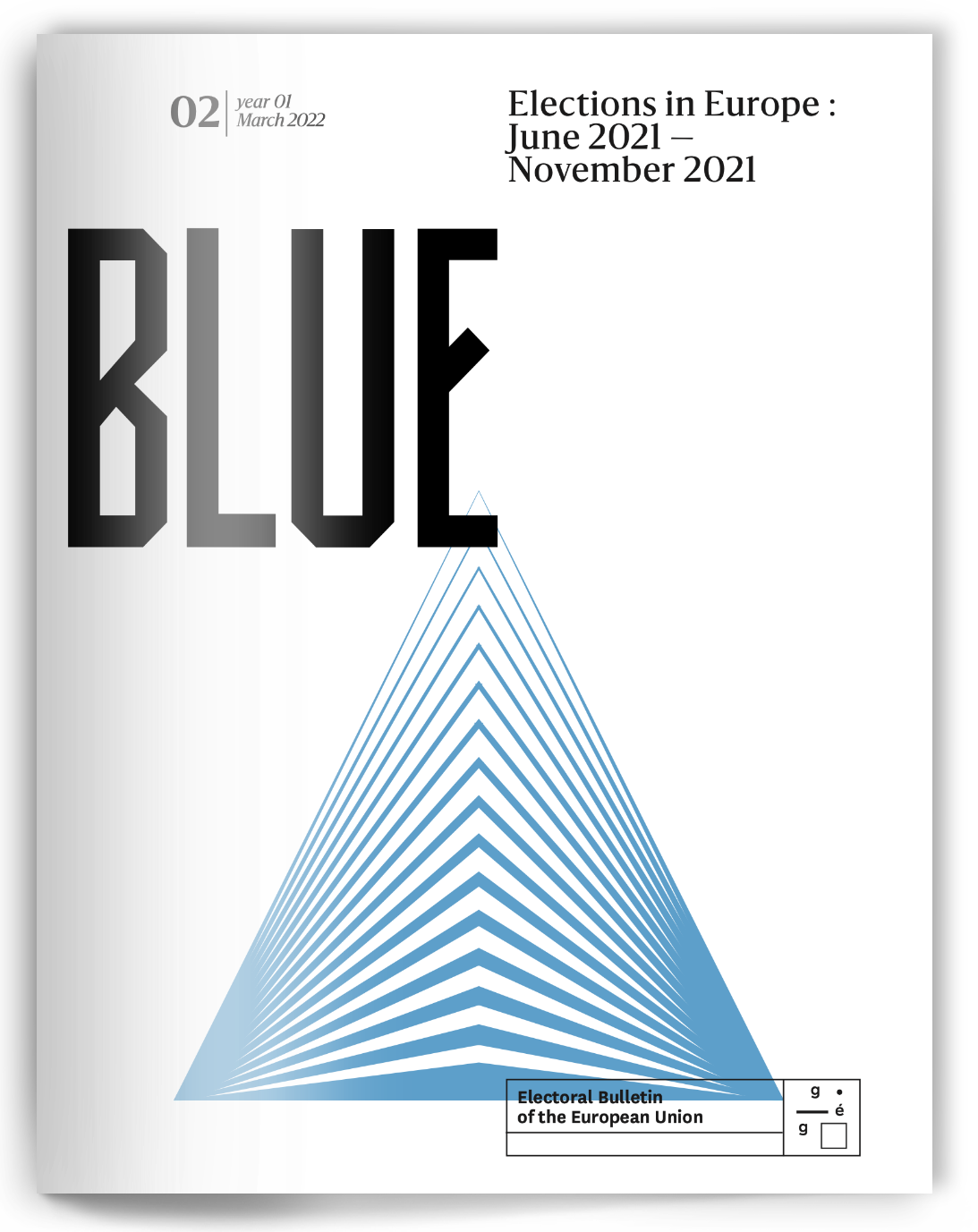
21x29,7cm - 167 pages Issue 2, March 2021 24,00€
Elections in Europe : June 2021 – November 2021
Unlike Martinique and Guyana, Guadeloupe is both a department and a region. The two authorities overlap and share the same territory, forming a DROM (overseas department/region) whose name has no juridical correspondence. In the light of the law and the constitution, only the department and the region exist.
In 2021 the “dromatised” voters were called upon, on the same day, to vote to designate separately, but in the same offices, departmental councilors elected by a two-round majority system in the cantons and regional councilors designated by a two-round majority list vote throughout the country.
This complexity of the electoral game did not have a major impact on the conduct of the elections, nor on the expected results.
However, compared to the 2015 regional election, the 2021 election is marked by notable differences, the first of which is the quasi plebiscite of the outgoing president. Indeed, Ary Chalus of the “Continuons d’avancer/Keep foward” list was re-elected in the second round with a very high score.
In 2015, he was elected with 57.49% of the votes, obtaining 28 of the 41 seats and defeating Victorin Lurel (42.51% and 13 seats), former minister and secretary general of the local Socialist federation.
In 2021, missing his re-election in the first round by 600 votes, Chalus won 72.43% of the votes in the second round and 33 seats. He beat Ms. Borel Lincertain of the Socialist Party federation at the head of the “péyi-gwadloup” list and outgoing president of the general council. Chasing two hares at the same time, she recorded a double failure. She was defeated in the regional elections (22.57% and 8 seats), and also in her canton, which shut her out of the departmental council that she used to chair.
Other differences were the high rate of abstention and the increase in the number of concurrent lists. In 2021, 12 lists competed harshly, but the number did not prevent a record abstention rate of 64% of registered voters. In 2015, there were 10 lists and an abstention of 43%. Ary Chalus’ plebiscite election is therefore accompanied by a low voter turnout.
Compared to other French Caribbean territories, Guadeloupe has the highest abstention rate. In 2021, Martinique had an abstention rate of 56% and Guyana 54%. This difference is all the more surprising given that during the last regional elections in 2015, the Guadeloupean archipelago had the highest turnout. The abstention rate was 42.68% in Guadeloupe, 53.35% in Guyana and 47.66% in Martinique.
It is highly likely that the increase in the abstention rate in 2021 is associated with the health situation and the dramatic consequences of the spread of COVID 19 in the West Indies and particularly in Guadeloupe. Voters whose mobilization is low or erratic in normal times have certainly avoided taking risks by voting.
But in parallel to this hypothesis, we must take into account a new and young political offer, particularly in Guadeloupe, which probably limited abstention despite its high score. It is not in Guadeloupe that the political offer is the most developed. If there are 4 lists in Guiana, in Martinique there are 14.
The four Guyanese lists have the characteristic of being coalitions and of giving an important place to civil society, which has reduced the profusion of lists. The Guyanese lists tend to bring together several parties, whereas the main Martinique lists present at the last election imploded, thus favoring a multiplication of lists.
In Guadeloupe, we are also witnessing the emergence of ‘civil society’ through several lists that claim to be “citizen lists”. In particular, there are personalities who express their discontent on social networks, have used the regional election to oppose vaccination and the health pass and promoted an individualistic representation of freedom.
The almost inevitable consequence of these choices is a populist discourse mixing refusal of speed cameras, conspiracy arguments on new vaccines or the right to decide on one’s own body.
The electoral results of these lists are very low, ranging from 0.58% to 2.88%. Most commentators interpret the participation of these “citizen lists” as a renewed interest in politics. The argument is objectively true even if the results are low, but one must add to the explanation the growing mistrust and dissatisfaction with a political class that does not meet the expectations of the population.
This is probably one of the explanations for the NOU surprise in this regional election. The NOU list is not a “citizen” list, it proclaims itself nationalist. It is made up of young candidates with an unprecedented sociological profile (several company directors are on the list), modern and effective communication methods and an astonishing capacity for mobilization. It did not win any seats but became the third political force in the territory with 9.39% of the votes in the first round. The last time a political organization claiming to be nationalist participated was in 2004. It obtained 3.94% of the votes.
The electoral failure of this list is perceived by its “captain” as a political victory because of the growing interest of its discourse and the number of members that the group would register since the regional elections.
L’ampleur de la victoire d’Ary Chalus, associée à celle deThe scale of Ary Chalus’ victory, combined with that of his political partner: Guadeloupe Unie Solidaire et Responsible/Guadeloupe united, supportive and responsible (GUSR) chaired by Guy Losbar, could lead to a reshuffle of the political landscape. The first victim of this ongoing recomposition is the local federation of the Socialist Party, which has been greatly weakened in the regional council and deprived of the presidency of the departmental council. The mayor of Lamentin, one of its main elected representatives, is participating in the foundation of a new movement whose acronym is evocative: Gwadloup Plurielle et Solidaire/Plural and supportive Guadeloupe (GPS).
This reorganization is based on a more or less explicit slogan, the localization of power, which was one of the themes of the regional campaign. Everyone adheres to it in different ways.
Beyond the differences in interpretation, the feeling of belonging to a territory, to a cultural identity is making its way. The Creole language is spoken with no difficulty in all areas and by all. Even the former prefect of Guadeloupe, who became the chief of staff of the Minister for Overseas France, did not hesitate to say a few words in Creole to conclude interviews. The flag of the pro-independence party Union Populaire pour la Libération de la Guadeloupe/Popular Union for the liberation of Guadeloupe (UPLG) has become, for the growing number of people who wear it, a “national” emblem without being associated with independence. These are all signs of a renewed Guadeloupean identity that is gaining in identity affirmation while losing in protest vitality. In other words, the affirmation of identity does not mean that voters are ready to leave a dependence that, in their eyes, provides resources (Reno 2001 ; Reno 2021). In this area, few lists take the risk of proposing an adjustment of this dependence by openly asking the question of autonomy. They agree on food autonomy and energy autonomy without understanding that these would probably be the possible dimensions of a credible formulation of political autonomy. The global context, the discourse of state representatives and the local demands argue in favour of this autonomy.
The contract of joint governance, signed after the regional and departmental elections between Ary Chalus, candidate for the presidency of the region, and Guy Losbar, candidate for the presidency of the department, is interesting from this point of view. The aim is to bring the two assemblies closer together in order to develop and implement more effective local public policies.
This contract would avoid the entanglements generated by the DROM, thus improving local decision-making.
The preamble to the document states this objective:
“We, the undersigned, candidates in the regional and departmental elections of 20 and 27 June 2021, affirm by our signature our desire to establish a Concerted Governance Contract to serve the effectiveness of our public policies and the development of GUADELOUPE. The sense of the country requires consultation and coherence between regional and departmental action.” (Contrat 2021 : 2)
We could even see it as a prelude to a change in status. The approach is explicit: “It is in this sense that we must Think Guadeloupe and Act Guadeloupe, to keep the course of a deep development of the organization of our institutions, while managing first of all the urgency of a more coherent and effective functioning of the departmental and regional actions” one can read in this document (Contrat 2021 : 2).
Various degrees of autonomy can be considered.
“Our reflection could therefore usefully focus on a reorganization of the institutional structure, a new distribution of competences, or even a real local normative power in certain fields of competence.” (Contrat 2013 : 3)
In reality, these prospects are not guaranteed by the convergence of the two executives.
The sacrosanct theory of blocks of competences is invoked, which may mean that the current institutional architecture could remain. However, it is sufficient to read one of the latest reports of the National Assembly on the assessment of decentralization (Questel & Schellenberg 2019) to understand that, at the local level, public policies are necessarily intersectoral and therefore far from being watertight, as this belief in the distribution of power in blocks of competences might suggest. The conclusion of this report is without appeal: the theory of blocks of competences is a dead end. The contract of concerted governance born before the local elections could also be a dead end if it ends up consolidating the DROM.
Beyond these novelties, two lists out of the twelve in competition have publicly and for the first time used the notions of ethnicity for one (Socialist Party), of Indo-Guadeloupeans and Afro-Guadeloupeans for the other (National Rally) to indicate the representativeness of their list in a territory where these notions are rarely used.
In both cases, the aim of the approach is not to protect a threatened community but to present society as a group of communities that have been brought together. The communities that are not explicitly identified or selected are united by a multicolored logo and thus a multicultural list, like the “péyi Gwadloup” represented by a mosaic. As anthropologists have shown with regard to the indigenous peoples of America, ethnicity can be a tool for transcending local identities and building broader solidarities, which is perhaps the objective of this list, whose characteristic is to bring together unknown ethnic groups whose only signs of recognition are the phenotypes of the people who make them up.
During the regional election, Europe is not very present in the electoral campaign. It becomes a political issue when the question of political change in the territory arises. The question generally boils down to whether or not it is in the interest of the community to remain in the European space and what status it should have: RUP (Région ultrapériphérique, Outermost Region) or PTOM (Pays et Territoire d’Outre-Mer, Overseas Country and Territory)? In 2003 and 2010, when the choice between the legal regimes offered by the constitution had to be answered, the debate was lively.
Those in favor of a legislative autonomy (Article 73) were convinced that this was the only option for maintaining the RUP status. The new wording of the constitution after the revision of March 2003 and the case of Saint Martin show that the state’s statutory offer and the territory’s European status depend above all on the political will of the elected representatives and the consent of the population.
Literature
Contrat (2021). Le Contrat de Gouvernance Concertée : pour une région et un département en capacité de répondre ensemble aux besoins des guadeloupéens. Online.
Questel, B. & Schellenberger, R. (2019, décembre). Rapport d’information sur l’évaluation de l’impact de la loi n° 2015-991 du 7 août 2015 relative à la nouvelle organisation territoriale de la République (loi NOTRe). Assemblée nationale, commission des lois constitutionnelles n° 2539.
Reno, F. (2001, January). Qui veut rompre avec la dépendance ? In Autrement, La Guadeloupe, Temps incertains, n° 123, pp. 236-249.
Reno, F. (2021). La départementalisation, la dépendance consentie : le paradoxe guadeloupéen. In Daniel, J. & David, C. (dir.), 75 ans de départementalisation, L’Harmattan.
citer l'article
Fred Reno, Regional election in Guadeloupe, 20-27 June 2021, Mar 2022, 73-76.
à lire dans cette issue
voir toute la revue






